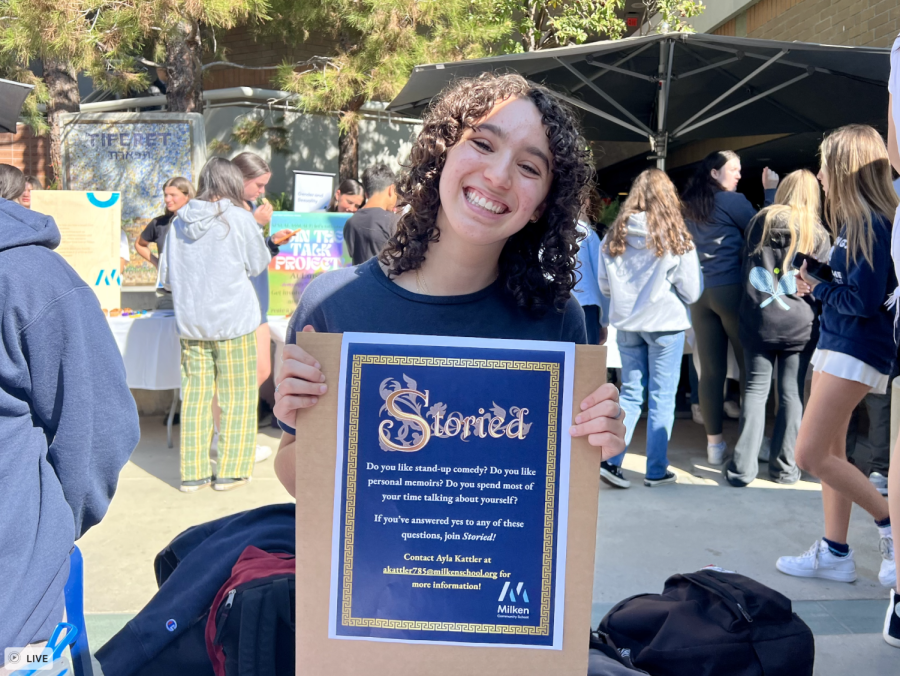Locked Out of Leadership: The Effects of New Club Guidelines on Student Leaders
Ayla Kattler ‘23 hosting the Storied table at Milken’s annual club fair.
Since the beginning of ninth grade, Ayla Kattler ‘23 involved herself in a variety of clubs on Milken’s campus. As time went on and her dedication to specific clubs increased, so did her leadership roles within them. Now, as a senior, Ayla is the leader of five clubs: Girl Talk, Mock Trial, Storied (which she founded), Sketch Comedy Club, and CAT (Connecting Apart Together).
But, after checking this year’s official club list, Kattler was disheartened to see her name removed by administrators as one of the leaders of Girl Talk. “I’ve been a part of Girl Talk for four years,” Kattler explained. “I absolutely deserve to call myself the president.”
Last school year, Milken administrators unanimously decided to implement a variety of new policies shifting club leadership guidelines. As part of these changes, students are only allowed to lead or co-lead one club maximum. While students can be active members of as many clubs as they choose, they can only place a leadership title on one club.
When Milken’s club fair happened on October 21, many club leaders voiced concerns about this policy, raising the question of whether or not this limitation stunts student creativity and diminishes leadership opportunities.
Ms. Carmelle “Leli” Kiesler ‘05, a Division 11/12 House Leader, explained that “to be a leader of a club, it’s really quite time-consuming.” In order to maintain student-run club status, each club must meet twice a month minimum and host at least two Onegs throughout the school year.
To ensure that all clubs are successful, Mr. Philip Rainer, the Division 11/12 Dean, believes that students should devote their energy to one club in particular. “When you have one person who’s the leader of five different clubs… none of those clubs are really robust and strong, because there’s nobody really focused on it,” Rainer explained.
Oftentimes though, clubs are equally run by multiple people. Tiegether, a bracelet-making club dedicated to uplifting students’ mental health, is equally run by Mikaela Chemerinksi, Arielle Epstein, Sofia Goldenstein, and Stella Goldstein. All four people are able to call themselves leaders because they aren’t the primary leaders of other clubs on campus.
Kiesler says that students can choose to be the vice president or secretary of a club, rather than being the head. In her eyes, this makes students more accountable for specific roles. However, it also makes leadership roles more competitive. Sharing the same leadership roles eases the burden of running a club and makes the experience more enjoyable.
Oftentimes, clubs don’t need different leadership roles. At public schools where club meetings may have hundreds of students in attendance, different roles may be necessary to a club’s success.
However, clubs at Milken don’t face this issue. With clubs of 20 or so students, various leadership positions complicate the process. When different roles are added, “there are power imbalances,” Kattler explained. It gets more difficult to differentiate whose jurisdiction overpowers another’s.
Some believe that assigning just one person to the title does a disservice to others who put in the same amount of effort. With Board Game Club, for example, Eitan Feldman and Lior Berrin were faced with a difficult decision. Since Feldman wanted to start the Science Bowl club, he was forced to remove himself as a leader of Board Game Club, despite maintaining his original leadership duties.
Oren Figenblat ‘23 shared a similar experience. Though he was an active leader of Chess Club, he was equally as passionate about game development, and wanted to start a club geared towards that interest. In order to do so, he had to remove his title as President of Chess club, even though his role in the club remains the same.
Kiesler also explained that a reason behind this shift was to “give [leadership] opportunities to other people on campus.” When the same student runs multiple clubs, Kiesler believes that leadership positions will heavily focus on just a few select students.
While this may help students who are creating new clubs, it fails to account for students who have already gained multiple leadership positions prior to the enforcement of this policy.
Oftentimes, when club leaders approach the end of high school, they pass down their leadership roles to the most committed members of their clubs in order to ensure their club’s sustained existence in the following years. Now, if a student gets approached about multiple club leadership roles, they’ll have to choose one and give up the others. “When it comes down to inheriting clubs… pick the one that you’re most passionate about,” Kiesler stated.
In doing this, students’ creativity is boiled down to just one endeavor. Many students have a wide variety of interests, hobbies, and passions that may not be represented on Milken’s campus.
In Kattler’s second year at Milken, for example, she noticed a lack of storytelling clubs. She created Storied to provide a forum for student writers to perform personal narratives on campus. Since then, she has hosted multiple storytelling performances for her classmates across the greater Milken community. Had she restricted herself to just one leadership role, Storied would have never been created and students would have had no opportunity to participate in the first place.
While other students could start storytelling clubs, Kattler’s passion for the Moth Radio Hour made her uniquely suited for this leadership role. Because of her distinctive storytelling expertise, she is able to guide other club members in a way that nobody else can.
But after creating Storied, Kattler was denied her original leadership positions in other clubs. “You can have other leadership positions,” so long as the main title is given to someone else, Kiesler explained.
In some cases, that means giving the leadership role to another student. In others, that means converting a student-run club into a departmental club since those are ostensibly run by faculty.
For students who are already club leaders, this restriction places an unfair ultimatum on them: keeping the leadership they already have or giving it up to focus on a different passion of theirs.
“I don’t want to call myself a program coordinator,” Kattler explained in reference to her role leading Girl Talk. “It’s inaccurate… what I’m doing is I’m overseeing everything.”
Ridding students of an official title does not necessitate an actual change in their leadership role. Rather, it just strips them of the credit. For students who are capable of maintaining multiple leadership positions, this policy rids them of that opportunity completely.
Kattler was told that to remedy this situation and maintain her roles in Sketch Comedy Club and Mock Trial, they could be made into departmental clubs, as those are “not held to the same requirements” as student-led clubs, according to Kiesler. However, a departmental club is defined as one that is primarily run by faculty. Neither Sketch Comedy Club nor Mock Trial falls into this description.
“It doesn’t mean anything in practice,” Kattler explained. Both of these clubs function in the same ways as student-run clubs.
Clubs are formed as a way for students to find community, explore their interests, and create positive change. Why should that be limited?

Maya Ziv is a senior at Milken and the Co-Editor-in-Chief of The Roar. After finishing the show, Unorthodox, Maya found that she had nobody to talk about...




Adina • Nov 2, 2022 at 1:56 pm
This is amazing!!!
Spencer Davis • Nov 1, 2022 at 5:47 pm
I really resonate with Ayla on this. Coby and I had to turn JSA into a departmental club to maintain our other club leadership roles, but it’s not really departmental. JSA is inherently student run, and it should be presented as such…